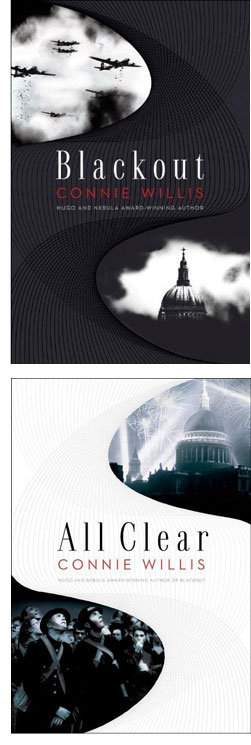 |
 |
 Connie Willis
Connie Willis
Blackout
Spectra / Bantam / Random House
US Hardcover First Edition
ISBN 978-0-553-80319-8
Publication Date: 02-02-2010
512 Pages; $26
Date Reviewed: 09-25-2013
Reviewed by: Rick Kleffel © 2013
All Clear
Spectra / Bantam / Random House
US Hardcover First Edition
ISBN 978-0-553-80767-7
Publication Date: 10-19-2010
656 Pages; $26
Date Reviewed: 09-25-2013
Reviewed by: Rick Kleffel © 2013
Index:
Science Fiction
General Fiction
We learn nothing from the past, no matter how much we study it. Everywhere — every when — we turn, we find nothing but mirrors that prove less informative than we'd like them to be. Connie Willis has made a specialty of observing humans who observe the past, first hand, using the science fiction device of time travel.
From her first story set in mid 21st-dentury Oxford, "Fire Watch" to 'Doomsday Book' and 'To Say Nothing of the Dog,' she's been sending men and women of the near future back into the timeline where they learn as much about themselves as they do about the past. Her most recent foray into the past was published as two novels, 'Blackout' and 'All Clear.' They're actually just one novel, an immersive example of reading as time travel.
The premise here is quite simple. Three students of James Dunworthy Michael Davies, Polly Churchill and Merope Ward — are prepping to be sent into the past. But something's off. Assignments change, and the trio ends up being sent to bits of the second World War in Britain for which they are less-than-suitably equipped. But they're smart, plucky and have the advantage of what should be 20/20 hindsight. Once they get in place, Davies at Dunkirk, Polly in London observing the Blitz, Merope scoping out children evacuated from London, things initially seem to have stabilized. When they realize that they cannot return to the future as planned, history itself is at stake. It is possible that they have altered their own future.
Over the course of more than 1100 pages, Willis manages to keep readers riveted with a huge and complicated vision of the past. 'Blackout / All Clear' is an outstanding work of historical fiction even as it uses the science fiction genre to ratchet up the tension. What makes Willis' work so wonderful is her ability to combine a vision of the horror of war with a truly human vision of her characters. This is a big book, with a large cast, and Willis explores more than the historical setting; she reveals her expansive vision of the essential nature of humanity; a comedic, tragic, heroic combination that shifts at a moments' notice.
In sending three individuals into an enormous historical setting using the science fiction trope of time travel, Willis contemplates the import of the individual. In this book, by virtue of the fact that the time travelers come from the future, the ability of an individual's actions, even someone seemingly insignificant, to change history, are fraught with disastrous potential. But that possibility is also perfectly clear. Willis intimately combines history and science fiction to explore just what it means to be an individual, the import of our choices.
While 'Blackout / All Clear' do tell and long and involved story, Willis makes every word and every action count. Indeed, that's not just a writer's technique; it's an essential part of the plot. Willis takes readers into the past, the present and the future with skill, humor that often trends to farce and prose the evokes everything with clarity and grace. If there's a surplus of anything in this book, it's grace. Willis seems to know us better than we know ourselves, knows our better selves, and reveals to readers an appealing vision not of history, or some future where things will get better. We may not learn from the past, but from reading Connie Willis, in the present, we can learn that we are worthy of examination of self-examination. If we rattle about with an open mind and a sense of humor, we're likely to find an imperfect past, present and future — but as well, humans who can make the best of whatever circumstances present themselves.
|
 |
|
|
 |
| |
Review Archive
All Reviews alphabetized by author.
General Fiction
Non-Genre, general fiction and literature.
Horror
Supernatural fiction, supernatural horror and non-supernatural horror.
Science Fiction
Science fiction, science fantasy, speculative fiction, alternate history.
Fantasy
Fantasy, surrealism and magic realism.
Mystery
Crime, thrillers, mystery, suspense.
Non-Fiction
Non-Fiction, True Crime, Forteana, Reference.
Poetry
|
|
 |
|




